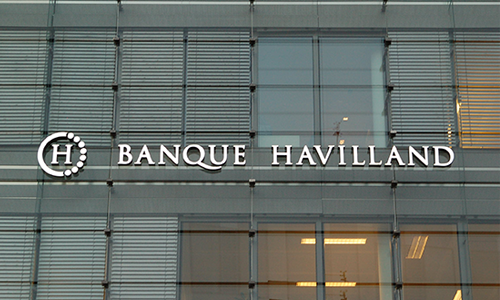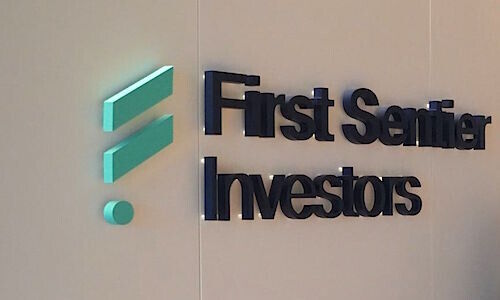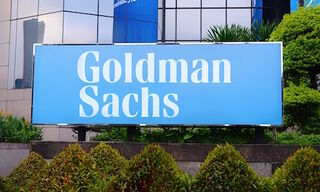Banque Havilland: Is UBS Kicking the Owner Family Out?
With its banking license gone, the Luxembourg bank is now in suspension of payment by the financial supervisory authority CSSF. It emerges that the owner family is at the center of attention: British billionaire David «Spotty» Rowland is personally facing regulatory sanctions. And UBS apparently wants to end the client relationship with the Rowland family.
Banque Havilland is currently going through what one might call a meltdown in nuclear physics.
Nearly a month ago, it became known that the Luxembourg supervisory authority CSSF and the European Central Bank (ECB) were after the Luxembourg financial institution’s license. On August 1, the ECB’s banking supervision, the authority responsible for this matter, revoked Banque Havilland’s banking license in Luxembourg, where the bank employs over a hundred people—a decision the institution is legally challenging.
Voluntary Liquidation in Liechtenstein
Shortly before that, on 30 July 2024, Banque Havilland’s Liechtenstein subsidiary, which also operates a branch in Zurich, announced the return of its banking license and its voluntary liquidation. The liquidation is being handled by KPMG as liquidator, together with Jean-François Willems, board member at the Luxembourg headquarters, and group CEO Marc Arand.
At the beginning of August, Banque Havilland told its clients and the public: «We understand that many questions will arise, and we are committed to providing timely and transparent information.»
Forced Administration in Luxembourg
So far, however, that has not been the case.
The bank has not provided any explanations for its existential regulatory difficulties. Moreover, the regulators have been equally vague. The announcement of the license revocation came without any hint of an explanation.
«Serious and Repeated Violations»
At least, initial clues are now emerging from the court proceedings concerning the forced suspension of payments of the bank by the supervisory authority CSSF, which took place last week before the Tribunal d’Arrondissement de et à Luxembourg.
The Luxembourg publication «Reporter» (article behind paywall) reports that while the bank is not legally challenging the suspension, it is nevertheless disputing the allegations that «CSSF on-site inspections uncovered serious and repeated violations in corporate governance and anti-money laundering and counter-terrorism financing measures.»
Lawyer Fisch Takes Charge
It now appears that the license revocation is indeed related to issues of governance and money laundering. In Luxembourg, Ernst & Young, as well as lawyer Laurent Fisch and his firm, have been appointed to oversee the forced administration.
The court ruling, which finews.asia has seen in anonymized form, also states that the bank is disputing the claim that «Person 4 should be sanctioned for orchestrating and enabling the aforementioned violations.»
Who is «Person 4»?
According to Luxembourg's «Reporter,» «Person 4» is none other than David «Spotty» Rowland, the British billionaire who acquired Banque Havilland in Luxembourg in 2009 from the remnants of the bankrupt Icelandic Kaupthing Bank following the financial crisis.
A personal friend of the scandal-ridden Prince Andrew, who opened international doors for Havilland, a major donor, and briefly Treasurer of the Conservative Tory Party, Rowland also claims to have been a confidant of former Prime Minister Margaret Thatcher. David Rowland is certainly one of the most colorful figures in the character-rich English business world.
Connections to Troubled Russians
But this brings us back to Banque Havilland. Rowland also seems to have had close business ties with figures from Russia who are considered problematic.
Since neither the bank nor the regulators have provided clear information in this matter, finews.com posits that David Rowland and his bank may have been sanctioned because the bank's owner displayed too great a risk appetite in dealing with Russian oligarch clients.
Two Top Oligarchs as Clients
One of Banque Havilland's clients in Luxembourg was Gennady Timchenko, one of the wealthiest Russians with direct ties to the Kremlin, with an estimated fortune of $12 billion, according to Bloomberg.
Timchenko has held a Luxembourg passport and has conducted business out of the Grand Duchy for a long time.
Circumventing Sanctions?
There is currently no concrete evidence that the Luxembourg bank aided the sanctioned Russian Timchenko in circumventing sanctions.
However, an interesting incident involving Banque Havilland owner Rowland and another oligarch, Boris Rotenberg, has surfaced. Rotenberg, who is said to have practiced boxing with Russian President Vladimir Putin during his early days in St. Petersburg, later amassed a fortune estimated at around $4 billion.
Meeting on Rowland’s Yacht in Monaco
Rotenberg was also placed on the US OFAC sanctions list in 2014 during the first wave of Ukraine sanctions, prompting Societé Générale to terminate their business relationship.
Nonetheless, Rowland arranged a meeting between the oligarch and his bank on his family yacht in Monaco in 2017, where Banque Havilland also has a subsidiary. The purpose of the meeting was to discuss opening bank accounts for Rotenberg’s then-non-sanctioned wife, Karina Rotenberg (who was only added to sanctions lists in 2022).
Account for the Wife
According to a major data leak linked to Rotenberg, which was referenced by the Organized Crime and Corruption Reporting Project (OCCRP), Banque Havilland opened at least one account for Karina Rotenberg while her husband was already sanctioned. «The Times» (article behind paywall) also reported on this.
The opening of accounts for companies controlled by Rotenberg in the British Virgin Islands was also discussed. Whether this actually happened remains uncertain.
Business Model: Circumventing Russian Sanctions?
The picture emerging is that of the owner of a small European bank willing to assist sanctioned Russians.
Based on the timeline—Rotenberg’s data leak occurred about a year ago—it is possible that this case provided Luxembourg authorities and the ECB with the grounds to take action against the bank now.
Increased Fines
Back in 2018, Banque Havilland was fined 4 million euros ($4.4 million) in Luxembourg for unspecified deficiencies in its anti-money laundering measures.
As «Reporter» now reports, another fine of 5 million euros was issued in May 2024 for a related offense.
Was Rowland’s Relationship with Russian Oligarchs the Bank’s Downfall?
This seems plausible, especially when considering that Rowland’s family office, the Havilland Group in Luxembourg, includes, in addition to UK real estate investments and the eponymous bank, the Austria-based oil and gas trader Liwathon Group.
The fact that Rowland himself, according to «Reporter,» is facing personal sanctions such as professional bans in Luxembourg, suggests that he may be the root of his Banque Havilland's regulatory problems—even though Rowland has not held any official position at his own bank for many years.
UBS Has Apparently Had Enough
Regardless, Swiss banking giant UBS is reportedly distancing itself from the Rowland-Havilland complex. According to finews.asia, UBS has blocked the payroll accounts of the Liechtenstein unit and is also said to have cut ties with the Rowland family as private clients.
As usual, UBS does not comment on customer relationships. Banque Havilland refuses to provide information on the reasons for the license revocation, its Russian clientele, or UBS blocking its payroll accounts. Similarly, the CSSF is silent, and the Rowland family is unavailable for comment.




























